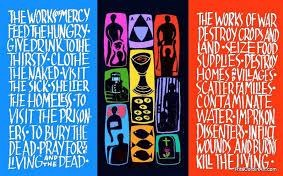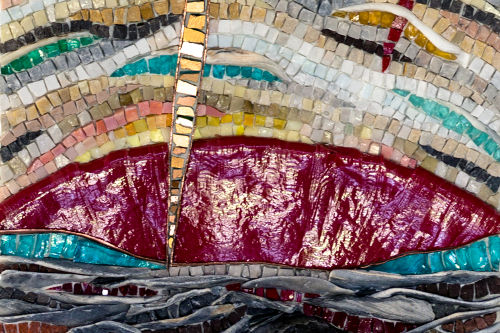
“Diamonds in the Snow” original mosaic by Christopher Warren Elam (see note below)
“…in most traditions, faith [is] not about belief but about practice. Religion is not about accepting twenty impossible propositions before breakfast, but about doing things that change you. It is a moral aesthetic, an ethical alchemy. If you behave a certain way, you will be transformed. The myths and laws of religion are not true because they conform to some metaphysical, scientific, or historical reality but because they are life enhancing. They tell you how human nature functions, but you will not discover their truth unless you apply these myths and doctrines to your own life and put them into practice. The myths of the hero, for example, are not meant to give us historical information about Prometheus or Achilles – or for that matter, about Jesus or Buddha. Their purpose is to compel us to act in such a way that we bring about our own heroic potential.”
— The Spiral Staircase, Karen Armstrong
On the tree-lined, windy road between our home and Bloomington, I replayed this section from Karen Armstrong’s memoir, The Spiral Staircase. The next day I typed up the passage and posted it on my bedroom wall. It resonated strongly with my own ideas about religion, and captured some of the motivation behind calling our community an interfaith Catholic Worker.
Over the past two years David has been leading the way down a curious path. Like freshmen do in college, he began again to ask the big questions: Is there a God? What about miracles? What is the origin of the universe? In other words, he was taking time to intentionally examine the supernatural beliefs handed down to him. The questions had been there a long time, but he finally got around to looking them in the eye.
To be honest, when he started asking those questions, I could see little point in taking time to answer them. Why bother when there are no objective answers? Even if there were, I would still believe in the Catholic Worker way of life. I had lived its truth, and felt the abundance, love, and struggle that led to wholeness. That’s why I liked what Karen Armstrong wrote. It was by enacting values that I have been changed, not by a belief in a literal resurrection or incarnation or deified God.
David may be a secular humanist or a religious naturalist or a non-theistic Christian – or some combination of all of those things. I may be a Jesus-follower, God-Is-Love, Catholic Worker. We’re different so we understand the world in different ways. And that’s okay. From our diverse theological beliefs we still come to the same place, a place that is well represented by the Catholic Worker movement, with its focus on radical collective action and social justice.

The Works of Mercy and The Works of War
Despite its name, the Catholic Worker movement is not part of the institutional Catholic Church. It is full of people who hold a variety of religious beliefs and practices. Some Catholic Worker communities are composed of Catholic members and some are not. The founders, Dorothy Day and Peter Maurin, were Catholics who discovered in the gospels and the social encyclicals of the Catholic Church instructions for how to live out their faith. They followed those instructions, particularly the Sermon on the Mount and the Works of Mercy, and started a movement that had a three-part program: round table discussions, the establishment of Houses of Hospitality to feed and shelter the poor, and farming communes to create an alternative to industrial, capitalist society.
Perhaps it is more confusing to be an ‘interfaith Catholic Worker,’ but our hope is to communicate our welcoming of diverse religious and theological beliefs and also name the way of life and the values that unite us. It’s helpful that the Catholic Worker movement already tends to emphasize practice rather than adherence to theological belief. As a decentralized movement with anarchist roots, it is a better example of orthopraxis than orthodoxy. Telling Catholic Workers what to believe will be met with resistance. But telling them what to do (feed the hungry, shelter the homeless, love your enemies, care for creation, resist violence and work for peace) will unite them in action. Whatever theological, religious or supernatural beliefs people hold, our hope is that we will be unified by the intentional way we live together at Common Home Farm. We don’t pretend it will easy to find language and rituals that resonate with diverse beliefs, but we think it is important to try.
A note about my own beliefs:
I was raised Catholic but wandered out of the Church while in college. I never found another spiritual home so I stayed out of religion for the next ten years. When I moved into the Bloomington Catholic Worker, I saw a lived expression of Christianity that helped me become a truer version of myself. I call myself Christian because my path towards transformation has been primarily guided by people from the Christian tradition — Jesus, Dorothy Day, Peter Maurin and all the ordinary radicals in the Catholic Worker and intentional communities movement. I remain a Christian because the practices articulated in the gospels, and in the Sermon on the Mount in particular, have proven to lead to wholeness. They are not easy, but they are not harder than what modern society demands of people. And they are deeply satisfying.

“The Cloud of Unknowing” original mosaic by Christopher Warren Elam (see note below)
I am still figuring out what my relationships is with Christian myth. The resurrection has a lot of meaning and symbolic power for me. But it does not matter to me whether or not it actually, literally happened. The same is true for most supernatural stories from the Bible. As for God, I believe in God but not the father-almighty-creator-of-heaven-and-earth. What I believe in is God as love. Not God as supreme being, but rather God as “The Spirit” or “The Mystery,” the nameless presence of a loving power. Nancy Ellen Abrams, in A God That Could Be Real, proposes that God emerges from our collective aspirations. In other words, all our hopes, ambitions, and dreams give rise to an emergent phenomenon we might call God. We create God rather than God creating us.
On good nights, I light a candle and pray before bed. I read an evening liturgy from Prayers for a Planetary Pilgrim, not because I think God will answer my prayers, but because reflecting on my day grounds me in gratitude and concern for others. Sleep comes more easily after I take time to put my mind and heart to rest.
My spirituality is changing, growing and deepening. I suspect it always will be. I desire to be in a community that values and supports the work of the soul and the spirit. For it is through life with others that my spirit is fed.
P.S. A big shout out to Chris Elam, my former community mate and dear friend, for letting me use these images of his beautiful, spirit-filled artwork. The images here don’t show the entire mosaics. Please visit his website to see more of his work at www.omosaico.com.
Your honesty, vulnerability, and wisdom brought me to tears.
My sister Peg said “Wow. just wow. Tahnak you for forwarding.”
Laura, Peg passed this article on to me. You have articulated so clearly the thoughts that constantly fly around in my head. Many thanks. Blessings on you and your mission.